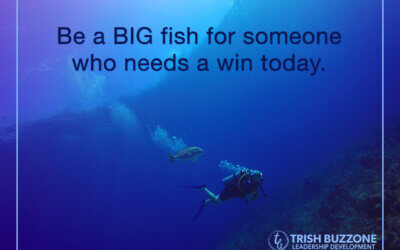Turn on the news during this pandemic, and examples of leadership, good and bad, are there for all the world to see. From local officials trying to balance the health of their constituents while protecting the future of their community; to military officers at odds over how to care for sick service members; to business leaders, small and large, trying to navigate their way through this crisis; to state and federal leaders balancing infrastructure needs with messages of hope.
Listen to one, and you find a leader living in the truth, offering comfort while delivering facts, actionable advice, and up-to-date information people need to make informed decisions in their own lives. These leaders are making sacrifices to bring people together, modeling what people need to see and hear in this time of crisis. Flip over to another channel and you find lack of clarity, obfuscation, and self-serving politics. A leader bragging about their personal wins, while placing blame and casting aspersions on other people.
These two scenarios are being played out in board rooms and offices, at clinics, bases, and ships and on conference calls across the world even as you read this. Leaders making decisions based on thinking that will inspire and motivate their people or push them closer to fear and anxiety.
As leaders, we all want to encourage and strengthen the people around us, especially in times of crisis when hope feels so distant. Where do we begin? How do we know if what we’re thinking and doing will motivate and inspire, or cause fear and distraction? John C. Maxwell offers this as a baseline:
“You know you’ll make the right decision when you put people first.”
When we put people first, we actively listen, strengthen connections, gain traction, and build momentum with a contagious vision informed by faith and energized with hope. As leaders in a crisis, we need to model this, living out an example that will help our team focus, connect, and move forward in unity.
This starts with us, because we’re more effective when we’re focused and healthy ourselves. In a world defined by the solitude of social distancing, we have a lot of time to think. What we choose to think about makes a huge difference.
In a crisis, if we’re not aware and not intentional, there are many things that may hijack our thinking. With the 24-hour news cycle almost entirely dedicated to pandemic coverage, delivered through every possible media option, just trying to separate the important data from the noise and the fear is exhausting. Trying to do so when our thinking is already clouded with fear and worry is even more taxing. Being effective leaders in a time of crisis begins with protecting our thoughts. We know this threat is real. We’re worried for good reasons, and we all need to be intentional about seeking wisdom and filling our minds with truth.
Experiencing worry and anxiety about living in a time of pandemic and what the consequences will be, now and in the future, is natural.
Many of us know people who are sick. Some of us know people who have died because of COVID-19. We’re all grieving. And, with the constant stream of conflicting and changing information, we’re all working out who to trust… and how much to trust them. Our faith in humanity, in the system, and in ourselves is being tested. Our team members are doing the same; and they’re looking to us while asking similar questions.
Prioritizing Self-Care
With all the distractions, all the fear and worry and stress, it’s hard to focus, especially when we feel responsible for others. Self-care slips down our list of priorities, even though we know taking care of ourselves is necessary for us to show up for our loved ones and those we lead. To help us be intentional about self-care, the CDC suggests these steps to manage the roller coaster of emotions and the weight of worry that comes with living through a crisis.
- Take breaks. Schedule them if you have to. Turn off the news, stop the flow of negative information. Step away from social media and completely unplug.
- Take time to breathe, stretch, and to meditate.
- Slow down, especially for meals. Eat a healthier, well-balanced diet.
- Exercise daily and get a good night’s sleep.
- Avoid self-medicating with alcohol or drugs.
- Relax. Do something that makes you smile and helps you focus.
To this, I would add:
- Share your concerns and fears with people who appreciate your honest, authentic self, in an environment where neither of you will make judgements.
- Be an intentional connector. Call family and friends, share something positive and ask them to do the same.
- Celebrate together. Grief will come, and being joyful together will help sustain us.
Focused, faithful, and connected
Right now, there is so much vying for our attention, fragmenting our focus and threatening to leave us scattered, distracted, worried, and apathetic. For most leaders, apathy is not a familiar state of mind. However, in a crisis, many people, including many leaders, just hit a wall. We experience a version of what caregivers call “compassion fatigue.” With so much continual stress and worry, coming from so many directions without a break, our natural desire to lead is slowly replaced with fatigue, boredom, and even cynicism.
All of this is exacerbated by the continual distractions. In addition to the task distractions we manage on a daily basis, we have additional mental, emotional, and financial worries… and, worse, we have no idea when we may experience relief. Most of us realize, on some level, our world is forever changed, and we don’t know what it will look like on the other side of this crisis.
Effective leaders are intentional about protecting, feeding, and encouraging their minds. We know that distractions are the actions that pull us away from all we want in life. We understand that gaining traction is the first step in building momentum toward that life, and yet all these distractions are happening that grab hold of us and pull us back. We break free and move forward when we:
- Strengthen connections to people and things that inspire and energize us
- Maintain focus on what we want our lives to be
- Remain faithful to our beliefs, truths we know will not change no matter the circumstances
- Practice intentional empathy
No matter how many times we are distracted, no matter how many times we slip off course, stand up, and start moving forward again. Focus on one thing and get it done. Do not allow the distractions, even other worthwhile tasks, to distract. Get that win and focus on the next. Encourage others to do the same, whether they’re working with us, for us, or on their own. Celebrate those wins and allow that joy to energize our momentum.
We know this crisis isn’t going anywhere, anytime soon, and that means stress, distraction, fatigue, and grief will still be with us. When we’re intentional about our focus, walking in truth, and keeping our life-giving connections strong, we will find our way through and show others how to do the same.
Will you courageously stand in the unknown?
Thinking partners make a huge difference in our lives. Even when we don’t immediately need them, there’s comfort in knowing we have people we trust to go to with our questions and concerns. But what about those times when there is no trusted advisor around...
Do you have dogs?
Do you have dogs? How an unexpected question transformed intention into action Recently, a friend shared with me how an unexpected question helped him move from intention to action. After role shifts in his career and at home, he’s been struggling to, as...
Are you choosing to actively listen?
When we listen TO someone, we hear what they are saying, and we often miss WHY they are saying it. The meaning behind the words reveals who the person is being in that moment. Are they frustrated or hopeful, determined or resigned? Are they focused on...
Creating the Gap
Creating the Gap It is impossible to be who we want to be while holding tightly onto who we are. We have all heard people say, “If you can imagine it, you can become it!” And that’s true. It’s also true, that if we don’t build the structure to...
Cancel Cancel
From time to time, all of us get stuck in stinkin’ thinkin’ that gets in the way of who we want to be. Sometimes, it’s in the moment. Other times, those negative thoughts linger, causing us to feel like there’s no way out. When that happens to me, I...
You will never lose helping others win
You will never lose while helping others win. Whether you offer positive encouragement, much-needed resources, or stand shoulder-to-shoulder and work alongside them, there is magic in helping someone achieve a dream or accomplish a goal, even if it’s...
Creating the Impossible
Imagine with me for a moment. Let’s climb into a time machine and travel exactly one year from now. In that future, looking back on today, what would you love to have created? What does your life look like? What does it feel like? Focus in on this vision...
Creative leaders making a difference
Creative leaders making a difference How the cast of Jersey Boys, the PorterBellas, the Babineauxs, LeVar Burton, Tony Coppola, and AT&T are creating ways to spread joy. The news that some cities and states across the country are “opening up”...
These leaders are making a difference
These leaders are making a difference How John Krasinski, Mat Shaw, Mark Baillie, Karsten Tüchsen, Todd Jones, and Carol Aberizk are finding ways to meet challenges, spread joy, and inspire hope In these times, we have a lot to distract us and bring...











0 Comments